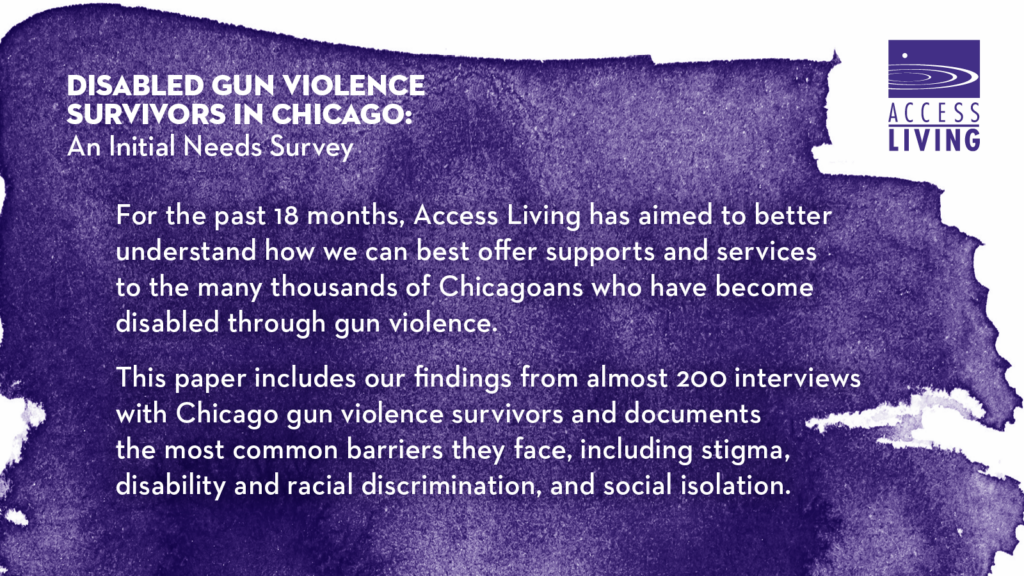Atta Zahedi
PR Coordinator
CHICAGO — Access Living, a leading disability service and advocacy center in Chicago, has released the findings of its first qualitative study into the experiences of Chicagoans who have become disabled due to gun violence. Access Living collected more than 150 firsthand stories over eighteen months from individuals and groups and interviewed government officials, community-based organizations, violence prevention leaders, and medical professionals, to better understand the needs of people disabled by gun violence.
Read – Disabled Gun Violence Survivors in Chicago: An Initial Needs Survey
Watch – Community Conversation on Becoming Disabled Through Gun Violence
Since 2010, more than 37,000 non-fatal shooting incidents have occurred in Chicago, leaving potentially thousands of people in Chicago with various new disabilities navigating things like finding accessible housing, accessing healthcare, and working with their newly acquired disability.
As a Center for Independent Living, Access Living seeks to increase its capacity to aid all people with disabilities in Chicago in their goals to live their fullest lives. The unique challenges in meeting these goals vary for Chicagoans newly disabled from gun violence. The survey was necessary to reveal and center shared experiences and needs of those individuals, especially those from Chicago’s Black and Brown communities.
“We have long been aware of the effects of gun violence and how it impacts individuals and communities in Chicago,” says Candace Coleman, Community Strategy Specialist at Access Living. “This project is the beginning of creating and advancing long-lasting support for disabled survivors of gun violence with community-based knowledge.”

The study started with a series of listening sessions with disabled gun violence survivors led by disabled peer facilitators. Shared commonalities among participants included hardship in accessing healthcare and mental health resources, housing, and community support while encountering systemic racism. The report can be found in its entirety here.
“Regardless of race and gender, the primary experience every participant shared after their shooting was a feeling of criminalization,” states the report. “Across the board, they felt that health care, law enforcement and their community networks were unprepared to handle someone disabled by gun violence and assumed criminal participation on their part.”
The interviews and research led to policy and service recommendations that can be followed by other disability-led organizations.
At Access Living, action steps include hiring two peer support coordinators who are survivors themselves, who will create a space to provide culturally competent community and individual lived experience for newly disabled survivors, and a peer navigator to connect the same population to independent living resources.
“These findings guide how to grow our services and advocacy on behalf of a rapidly growing segment of Chicago’s disabled community. We also need to raise awareness and ignite more conversations about how to assist people and communities nationwide dealing with the lasting effects of gun violence,” says Karen Tamley, CEO of Access Living.
This work was completed with funding from the Ford Foundation and the collaboration of experienced stakeholders and community members such as Lurie’s Childrens Hospital, Broken Winggz, and more. The thought leadership in this report reflects a city-wide and nationwide commitment to recognize and heal the trauma inflicted by gun violence.
“There is no justice or healing in any policy without bringing in a disability framework, and the Ford Foundation is honored to support a project that aims to see the entirety of a community’s needs,” says Rebecca Cokley, Disability Rights Program Officer for the Ford Foundation. “Recognizing the diverse experiences within the disability community ensures no one is left out of the disability justice work we prioritize.”
Access Living will continue to expand its peer support programs to include more specialized culturally competent care, such as hiring peer support mentors specifically for woman, men, youth, LGBTQIA+, and Latinx groups.
Partners and supporters who have aided the facilitation of this study include:
###
Established in 1980, Access Living is a center of service, advocacy, and social change for people with disabilities led and run by people with disabilities. We envision a world free from barriers and discrimination – where disability is a respected and natural part of the human experience and people with disabilities are included and valued.